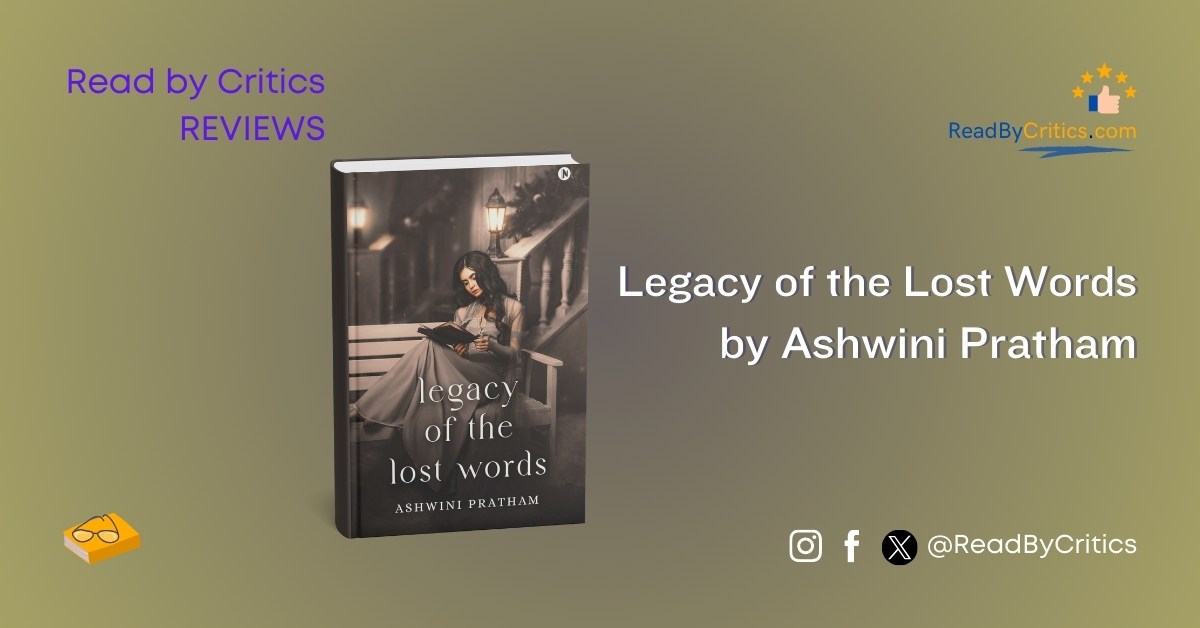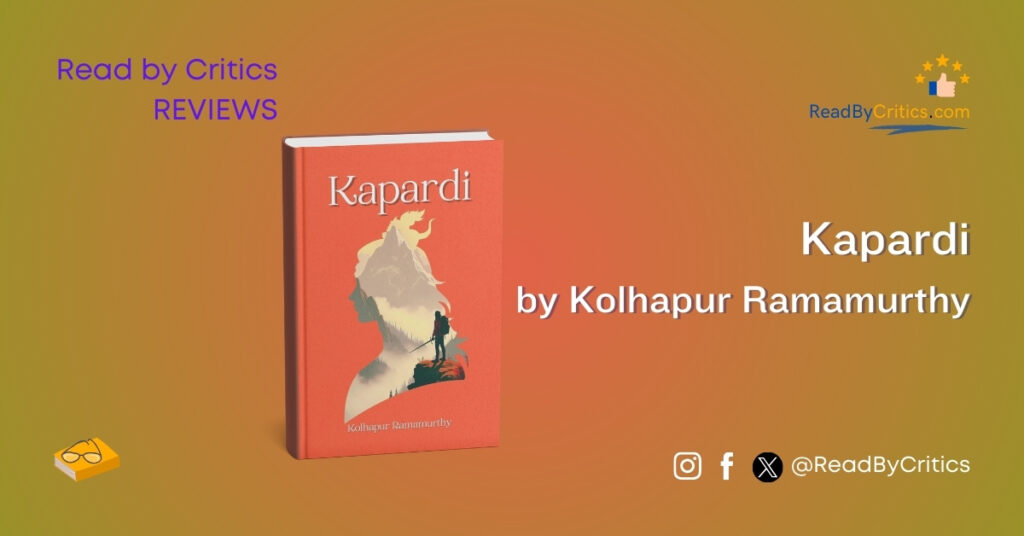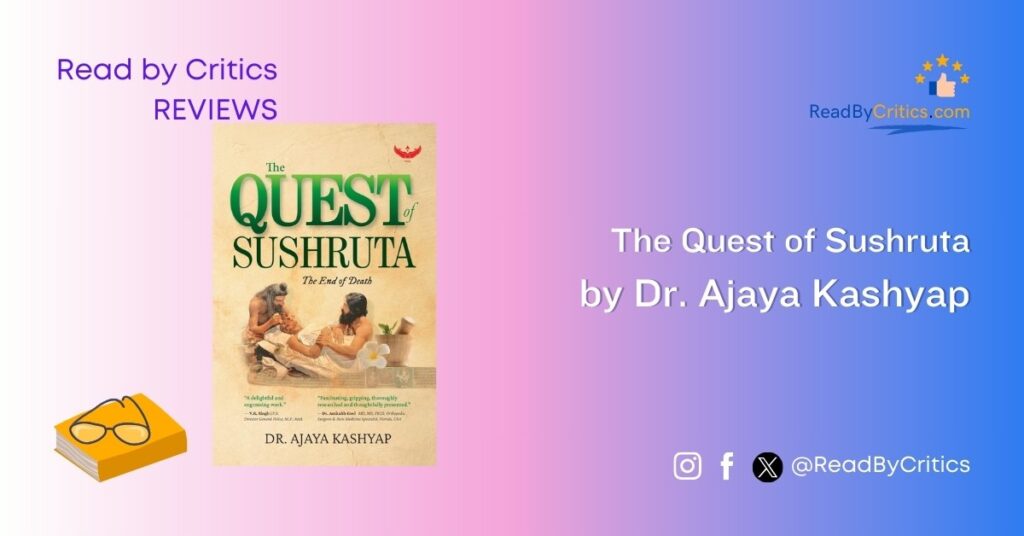Title: Legacy of the Lost Words
Author: Ashwini Pratham
Genre: Family Saga, Historical Fiction, Romance, Mystery
Publication: Notion Press, 214 pages (2025, January)
Setting: Mumbai, India, and Nandipur, a village in India
Themes: Forbidden love, societal constraints, family honour, resilience, uncovering hidden truths
Main Characters: Aanya (protagonist), Savitri (Dadi), Dev (Savitri’s lover), Rohan (Aanya’s friend), Meera Sharma (Aanya’s mother)
Let me accept at the very beginning that this novel will resonate with female readers… especially those who understand the importance of love in their lives and how the world revolves around this idea called love. It does not mean, in any way, that men will not enjoy the novel. They will, and even more so because Dev, one of the novel’s protagonists (from the past), is an exemplary man that this story has to offer the world! I have read many love stories in my life. This one hits all the high chords – story, plot, intrigue, allegorical output… what not! Let’s enter the world that Aanya discovers through Savitri’s old diary.
As a female reader, Legacy of the Lost Words by Ashwini Pratham resonates deeply, not just as a story but as a mirror reflecting the complexities of love, sacrifice, and resilience many women navigate. The novel’s exploration of forbidden love, societal constraints, and the enduring power of memory speaks to the heart. It offers a poignant reminder of how love—both its presence and absence—can shape generations. Through the intertwined lives of Savitri and Aanya, Ashwini crafts a narrative that is as much about the transformative power of love as it is about the courage to reclaim one’s voice.
The Dual Timelines: Love Across Generations
The novel’s dual timelines—one following Savitri’s hidden romance in 1950s Nandipur, the other tracing Aanya’s quest to uncover her grandmother’s past—create a rich tapestry of love’s enduring legacy. Savitri’s story revealed through her diary entries, is a testament to the quiet strength of women who love fiercely despite societal barriers. Her love for Dev, a man of lower caste, defies the rigid hierarchies of her village, yet the weight of familial duty and societal expectations ultimately crushes it.
One of the most moving passages from Savitri’s diary captures the essence of her love:
“We met where roots embraced the earth and branches touched the sky—our sanctuary, our rebellion. But even the banyan could not shield us from the storm.”
This quote encapsulates the duality of love as both a sanctuary and a battlefield. The banyan tree, a recurring symbol, becomes a metaphor for Savitri and Dev’s love: ancient, enduring, yet constrained by the soil that nourishes it. As a reader, I was drawn to Savitri’s quiet resilience and ability to carry the weight of her love even when it was forced into silence. Her story is a reminder of how love, even when forbidden, can leave an indelible mark on the soul.
Aanya’s Journey: Love as a Catalyst for Self-Discovery
Aanya’s journey to uncover her grandmother’s past is equally compelling. As a modern woman, Aanya represents the freedom Savitri never had, yet she too grapples with the constraints of familial expectations and societal norms. Her discovery of Savitri’s diary catalyses her self-discovery, forcing her to confront the silences in her family’s history and how they have shaped her identity.
Aanya’s relationship with Rohan adds another layer to the novel’s exploration of love. Unlike Savitri and Dev’s love, which was thwarted by external forces, Aanya and Rohan’s connection is marked by mutual support and understanding. Rohan’s unwavering presence—whether through his sketches, journal entries, or quiet companionship—starkly contrasts the isolation Savitri endured. Their growing bond is a testament to the transformative power of love when it is nurtured rather than suppressed.
One of the most poignant moments in the novel is when Aanya reflects on her grandmother’s legacy:
“She wore her silence like armor, but the diary cracks it open, revealing the wounds beneath.”
This line struck a chord with me as a reader. It speaks to how women often carry the weight of unspoken pain, using silence as a shield. Aanya’s decision to break that silence—to write her grandmother’s story—is an act of love and liberation. It is a reminder that love, even when buried, has the power to heal and transform.
Themes: Love, Sacrifice, and Resilience
At its core, Legacy of the Lost Words is a meditation on the enduring and transformative power of love. Although forbidden, Savitri’s love for Dev becomes a source of strength that sustains her through years of heartbreak and loss. Her decision to marry Rajesh—a man her family chose—is not an act of resignation but a calculated sacrifice to protect her descendants from the shame and judgment she endured.
The novel also explores how love can be both a source of pain and a catalyst for growth. Dev’s disappearance, orchestrated by his own family to protect their standing, is a chilling reminder of the era’s brutal pragmatism. Yet, even in exile, Dev’s love for Savitri remains unwavering. His final letter, discovered in the hidden room of his haveli, captures the depth of his devotion:
“I left to spare you the weight of my name, but my heart remains beneath the banyan, where yours still beats.”
This quote is a testament to the enduring nature of love, even in the face of insurmountable odds. It is a reminder that love transcends time and space when it is genuine, leaving an indelible mark on the lives it touches.
Writing Style: Evocative and Immersive
Ashwini’s writing style is both lyrical and evocative, drawing readers into the world of Nandipur with its vivid descriptions and sensory details. The use of diary entries and letters adds a layer of intimacy, allowing readers to connect with the characters on a deeply personal level. The banyan tree, the haveli, and the diary become more than just symbols; they are living, breathing entities that carry the weight of the characters’ emotions and memories.
The novel’s pacing is deliberate, with each revelation adding complexity to the story. The gradual unveiling of secrets—through diary entries, letters, and conversations with villagers—creates a sense of suspense that keeps readers engaged. As a female reader, I appreciated how Ashwini balances the characters’ emotional depth with the broader social and historical context, creating an intimate and universal narrative.
Conclusion: A Legacy of Love and Liberation
Legacy of the Lost Words is more than just a novel; it is a tribute to the resilience and strength of women who defy societal expectations and live authentically, even in the face of adversity. Through Savitri and Aanya’s stories, Ashwini reminds us that love, in all its forms, has the power to transform, heal, and liberate.
As a female reader, I was deeply moved by the novel’s exploration of love’s enduring legacy. Savitri’s quiet strength, Aanya’s courage to confront the past, and the transformative power of love resonated with me. The novel is a reminder that our stories—the ones we tell and the ones we bury—can shape our identities and futures.
Legacy of the Lost Words ultimately celebrates love’s enduring and transformative power. It is a story about honouring the past while embracing the future and finding the courage to live authentically, guided by love and compassion. This novel is a must-read for readers who seek a deeply personal and universally resonant tale.
Legacy of the Lost Words is a radiant and unforgettable journey for readers who believe in the enduring power of love and the importance of reclaiming silenced voices.
I am sure you’d love reading this novel! Click here to get a copy from Amazon India now.
Review by Simran for ReadByCritics
.
Legacy of the Lost Words by Ashwini Pratham Book Review
-
Critic's Rating of the Book
Summary
A moving read… a family saga that extends its ambit beyond the family and transforms into a tale that many would hear and tale… a mark well-made with the very debut work by the novelist!




